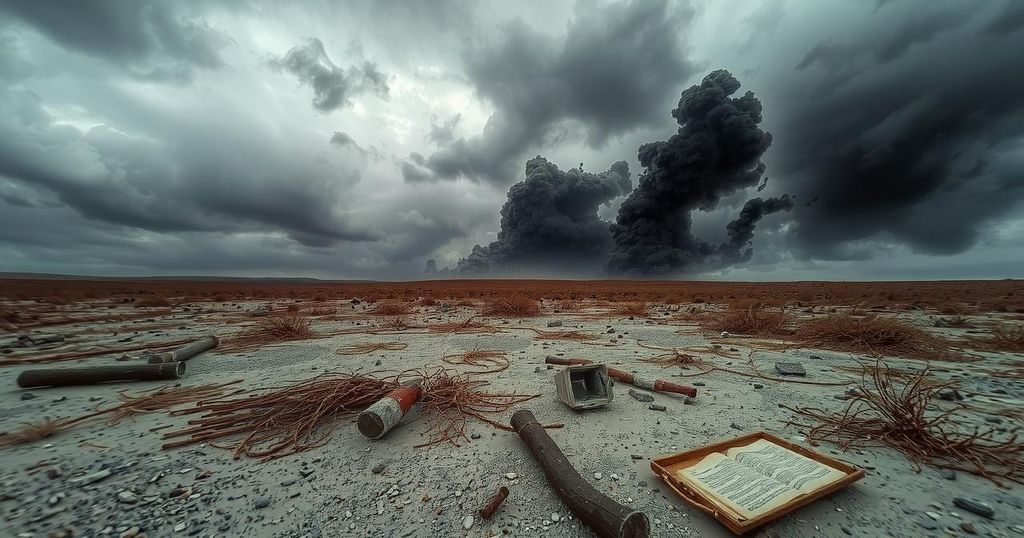The Brutality of HTS in Syria: A Call for Acknowledgment and Action

The recent massacre in Syria, carried out by Turkish-backed jihadists, reflects a gruesome level of violence similar to that of Hamas. The mass executions of minorities have received minimal attention from Western media, raising concerns about selective outrage. Despite claims of moderation, HTS, rooted in al-Qaeda, continues to wreak havoc, reflecting the dire state of democracy in Syria and the responsibilities of regional powers in the ongoing crisis.
The recent events in Syria have escalated to horrifying levels of violence, primarily driven by Turkish-backed jihadists. In a brutal massacre, over 1,000 individuals were executed by newly established Syrian security forces, echoing the atrocities committed by Hamas on October 7, 2023. The executions of Syria’s minority groups were marked by extreme cruelty, including forcing victims to bark like dogs before their deaths. Despite the severity of these events, there have been no significant responses from the West, raising questions about the selective outrage in international media.
For years, civilians in Syria have endured immense suffering at the hands of radical Islamist factions with support from regional powers such as Iran, Russia, Turkey, and Qatar. Following the ousting of Bashar al-Assad in December 2024, Hay’at Tahrir al-Sham (HTS), led by Ahmed al-Sharaa, assumed control. This faction lacks legitimate democratic representation and is rooted in terrorism, causing widespread skepticism regarding its capabilities to ensure the safety of Syria’s minorities.
HTS initially attempted to project a more moderate image, with Western media such as CNN providing a platform for Sharaa to present himself as a reformer. However, this facade collapsed sharply as HTS forces committed mass executions of approximately 830 Alawite Syrians within two days. This situation is reminiscent of the narrative surrounding former Iranian president Ebrahim Raisi’s successor, who was misleadingly portrayed as a reformist despite maintaining oppressive policies.
The media in the West has largely minimized the violence perpetrated by these jihadists, who were previously labeled as moderate. The latest atrocities began after an ambush by Alawites loyal to Assad, which provoked a severe response from HTS. The Alawite community, comprising roughly 10% of Syria’s population, along with other minorities like Druze, Kurds, and Christians, now faces grave dangers amid fears of the new regime’s authoritarian tendencies.
It is essential to recognize that the atrocities committed by HTS cannot be justified, as Syria is far from establishing a genuine democracy. The new leaders emerged from al-Qaeda, a fact that significantly undermines claims of reform. Recent demands from Alawite leaders for Israeli military intervention to stabilize Syria, given the failure of other powers, highlight the dire circumstances faced by minorities.
Regional powers Iran, Russia, and Turkey hold primary responsibility for the devastation in Syria, driven by their interests in countering Israel. This has created a disconnect in Western understanding of the brutal realities in countries governed by radical jihadists, leading to misplaced sympathies towards groups that exhibit extreme violence. In struggling regions like Syria and Gaza, radical factions like HTS and Hamas pursue their goals through genocidal violence rather than building governance structures.
The firm stance is clear: there is no such thing as a good jihadist. Radical Islamism only engenders chaos and destruction while betraying its own people, as seen with the ruin left in Gaza by Hamas, driven by destructive ideologies and external support.
In summary, the current situation in Syria illustrates the extreme brutality of jihadist factions such as HTS, which have replaced one tyranny with another. The lack of sufficient Western media attention and public outrage highlights a troubling disconnect regarding the realities faced by civilians in conflict zones. These jihadist groups embody radical ideologies that not only perpetuate violence but also undermine any aspirations for legitimate governance. Ultimately, it is critical to recognize the inherent dangers posed by such factions and to approach the complexities of the conflict with greater awareness and urgency.
Original Source: www.jpost.com








